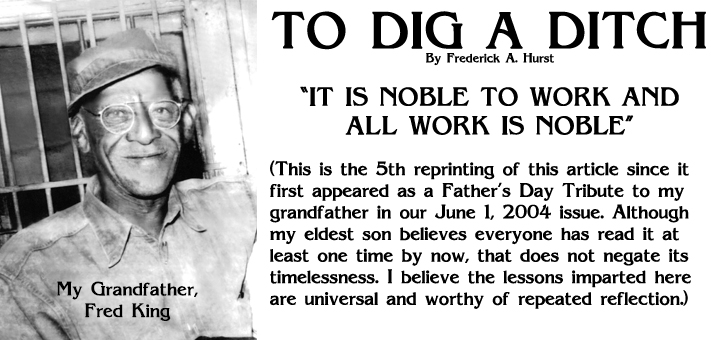—-By Frederick A. Hurst—-
“IT IS NOBLE TO WORK AND ALL WORK IS NOBLE”
(This is the 5th reprinting of this article since it first appeared as a Father’s Day Tribute to my grandfather in our June 1, 2004 issue. Although my eldest son believes everyone has read it at least one time by now, that does not negate its timelessness. I believe the lessons imparted here are universal and worthy of repeated reflection.)
I purchased a building that has now become our newspaper’s offices. Contractors were rehabbing it and some debris had accumulated in the street at the side of the building. I took out my broom, shovel and rake and commenced to remove the debris to my pickup truck when an old friend drove up. “Rick,” he barked with a note of disbelief. “You’re working like a common laborer!” I laughed and told him, “IT IS NOBLE TO WORK AND ALL WORK IS NOBLE,” which is what my grandfather used to say to me as he taught me how to dig a ditch.
On another day, the same person visited me in my new offices where I was working at my desk in my shirt and tie. He told me how he wanted a successful business of his own and asked me how he could accomplish it. I smiled and told him that I didn’t know, but that I attribute my own success to the rules that my grandfather taught me about how to dig a ditch. I satisfied his instant curiosity by relating what follows:
RULE 1: MAKE A LIVING BY FINDING SOMETHING THAT YOU CAN DO THAT THERE IS A MARKET FOR AND LEARN TO DO IT BETTER THAN OTHERS.
When my grandfather left his father’s farm in Georgia in 1927 to come north in search of work, he arrived with a fourth grade education and expertise working with his hands. He came to Springfield by way of Detroit, worked on the railroad for a time and eventually landed a job digging ditches for the City of Springfield—which was involved in a long-term effort to lay sewer pipes and break the reliance of homeowners on cesspools. The homeowners hired licensed plumbers to connect them to the new sewers. It saved the plumbers’ time and, therefore, money to subcontract the job of digging and refilling the ditches to my grandfather, whom they considered one of the best ditch diggers around.
RULE 2: PREPARE FOR WORK.
My grandfather taught me that the more time spent in preparation for work, the less time and effort needed to complete it. The bulk of the money earned on a given sewer job went to the plumbers. The way for the ditch digger to make good money was to dig many ditches for many different plumbers. Efficiency was key. The day before starting each job, my grandfather drove to each excavation site and made measurements and observations. He measured the distance between the house and the street, determined the type of soil and whether or not the home had a salvageable lawn, whether or not there were any obvious obstacles between the home and the street and whether or not he needed additional help. When we returned to do the work, my grandfather was always prepared with all the necessary manpower, tools and a plan of attack.
RULE 3: TIME IS MONEY.
Start early; work hard; work late. My grandfather understood that time was money and always had us on the road to the work site at six in the morning. Except for a short lunch break, we worked hard until sundown, if necessary, to complete a job. The quicker we completed one job, the sooner we could start the next one. I know a business owner who works eight hours a day and no more. He complained to me about not being able to make ends meet, and I very candidly told him that if he was committed to work only eight hours a day, he should work for someone other than himself.
RULE 4: TAKE PRIDE IN YOUR WORK.
My grandfather was a proud man who started every ditch-digging job with a standard of excellence in mind that required, not only that the job be completed, but also that it be completed to the customer’s satisfaction. So it should come as no surprise that the first tool he used for every job was a special spade for cutting the grass into neat sections. We would carefully remove each section with a flathead shovel and set it aside in its original order and keep it carefully nourished throughout the duration of the job for later careful replacement after the ditch was refilled. He applied the same standard to every aspect of the job with the test of success being that, upon completion, the landscape should be as it was or, in some cases, better than it was before we started.
RULE 5: LEARN THE TECHNICAL REQUIREMENTS OF YOUR WORK.
Homeowners marveled as they watched my grandfather and me dig hour after hour. They often wondered out loud about how we found the endurance. They believed that our endurance came from brute strength. My grandfather, however, was a technical genius whose techniques made digging a ditch much easier than it appeared to be. When I learned his techniques, I became his valuable assistant.
RULE 6: AVOID ECONOMIC LOSSES.
My grandfather understood the concept of “economic loss.” Nothing offended him more than when I came up with a half a shovel of dirt. If you go through the motions of digging only to come up with half a shovel full of dirt, you lose as much in the way of actual accomplishment as you gain. You’re leaving a half a load behind that you could have brought up in the same motion.
My grandfather also understood motion studies. He taught me to limit my motions to what was necessary to do the work. He was especially critical of my habit of standing up straight with each and every shovel full of dirt. It was inefficient and burned unnecessary energy. By holding the shovel properly, I learned that I could swing a shovel full of dirt without standing all the way up.
RULE 8: DO NOT MAKE EXTRA WORK FOR YOURSELF.
As far as my grandfather was concerned, anything coming out of a hole should be moved twice— once coming out of the hole and the second time going back in. This very important rule came to mind recently as I watched my wife clean every room in the house, in preparation for a reception we were having for our newly wedded daughter. As she cleaned a room, she would shift objects that did not belong out of that room into the next room. She moved most of those same objects again when she started cleaning the next room. This went on and on until all of the rooms were cleaned, but many objects were moved many times more than was necessary. My grandfather was always careful to toss dirt from a hole as far back from the ditch as necessary and no further than necessary, which avoided the dirt falling back into the ditch while making refilling the ditch easiest. Of course I didn’t tell my wife this rule, since she likes to clean house her way and any suggestions from me would be considered harassment.
RULE 9: AVOID UNNECESSARY WORK.
My grandfather loved tunnels. If the distance between a house and the sewer in the street was 30 feet, he would more than likely dig three six foot long ditches and two six foot long tunnels connecting them. Unnecessary work was a no-no.
RULE 10: ALWAYS COMPLETE THE WORK IN FRONT OF YOU.
Nothing causes more extra work in ditch digging than when you don’t complete the work in front of you. I’ve watched so many people digging a ditch straight down without cleaning the sides of the ditch until they’ve narrowed themselves into an almost unworkable space. They end up having to widen the ditch by scraping dirt from the sides down into the lower part of the ditch. Not only is it dirt in the way of your work, but it is also dirt that could have been removed with less effort and energy at the beginning. The object of the work is to move the dirt and carve the ditch as you go.
RULE 11: PACE YOURSELF.
My grandfather was a physical fitness expert. He understood that if you maintained a steady pace that suited your strength and ability—your optimum pace—and you were in reasonably good condition, you could dig all day with a short lunch break without tiring out. My younger brother occasionally helped us dig ditches. My grandfather and I used to laugh watching him tire himself out. In spite of my grandfather’s instructions to the contrary, my brother would start out rushing his work and invariably give out after the first couple of hours.
RULE 12: ALL OBSTACLES CAN BE OVERCOME.
Anyone who has dug in the earth on a regular basis knows you’re liable to find anything hidden underneath. You don’t know frustration until you have dug all day and begun tunneling only to run into a boulder that can only be removed by opening the tunnel into a ditch or of preparing for those last few shovels full to complete the ditch only to have excrement gush out of a cracked septic tank or to encounter sand so fine that none of the technical rules of ditch digging apply or of having ground water fill your hole. Like no other line of work, digging ditches is the one in which unexpected obstacles are the rule. In spite of my youthful angst, my grandfather taught me that in the end all obstacles had to be and could be overcome.
RULE 13: FINISH THE JOB RIGHT.
When the ditch was dug and the sewer pipe laid, we filled the ditch. But, at certain intervals, my grandfather would stop tossing dirt and run water into the ditch. The water served to pack the sand in so that by the end, all the dirt that came out of the hole fit back in. He knew that if we didn’t properly pack it in, the dirt would sink over time leaving an unsightly depression. I don’t recall ever having the unprofitable task of hauling away excess dirt. Then he would gently replace the grass that he had so carefully stored to the side and fill in the unavoidable cracks between the pieces with rich loam, sprinkle a little fresh seed and rake the area so clean that it almost appeared as though no hole had ever been dug. It was done in such a manner that within a few weeks nature would do its part and you would not be able to see a difference in the lawn as it appeared before and after.
CONCLUSION:
That’s how I learned to work. That old man was my surrogate father, mentor and dearest friend. I have applied his rules to every line of work that I have done, both nonprofessional and professional, and they have served me well. I have passed on his wise rules to my three children and they have served them well. You might try them and see if they help to make your dreams come true.
Attorney Hurst:
Thanks for printing the Tribute to your Grandfather and his rules for succeeding at work. I read the piece to my sons, ages 9 and 14, and added it to my collection of motivation materials. The valuable lessons you wrote about are well worth re-reading, every now and again.
Attorney John L. Roberts








